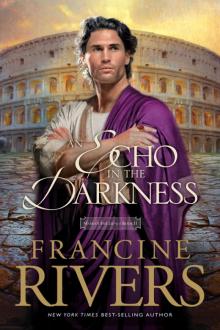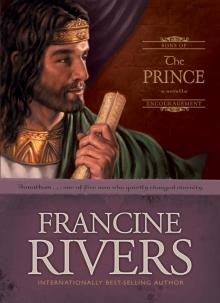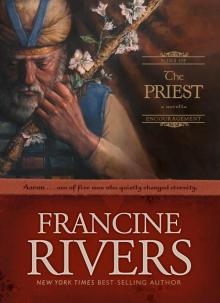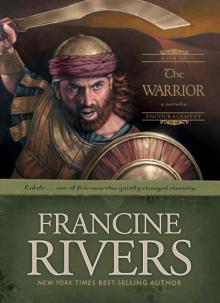- Home
- Francine Rivers
The Scribe Page 6
The Scribe Read online
Page 6
Of course, some did not understand. They scoffed, hearing only babbling and gibberish. Their minds were closed and dark, their hearts hardened to the truth. But thousands heard, and three thousand men accepted Jesus as Savior and Lord. In one day, our little band of 120 believers grew to over three thousand! I’ve wondered since: was it one language we all spoke? the language all men knew before the Tower of Babel? the language all believers will one day speak in heaven? I know not.
When Pentecost ended, though we did not want to depart from one another, most went home, carrying with them the knowledge that Jesus Christ is the resurrection and the life, Lord of all creation. Later, when I began my travels with Peter and Paul, we found those whose faith had taken root on Pentecost, and begun to grow in a hundred different places.
Those of us who lived in Judea remained in Jerusalem. We were one family, meeting together to hear the apostles teach all Jesus had taught them. We shared meals together, prayed together. No one suffered from need, for we all shared everything we had.
The Lord continued to manifest His power through Peter, who healed a lame man.
Peter, who had once denied Christ three times and hidden with the other disciples out of fear for their lives, now preached boldly in the Temple, along with young John.
The Sadducees and priests, led by Caiaphas and Annas, denied the Resurrection, and put forth lies they had paid the Roman guards to tell. But where was Jesus’ body? Where was the proof? In heaven!
The message spread, maddening the high council. The Holy Spirit moved like wildfire through the streets of Jerusalem. Two thousand more soon accepted Christ Jesus as the way, the truth, and the life.
Persecution and suffering came swiftly as Caiaphas and others of like mind tried to put out the fire of faith. Nicodemus and Joseph of Arimathea were expelled from the high council and shunned by religious leaders. Peter and John were arrested. Gamaliel, a righteous man devoted to God, spoke wisely, suggesting the council wait and see if the movement would die on its own. “If this is from God, you will only find yourselves fighting against God.” The high council ordered Peter and John flogged before being freed.
We all hoped Gamaliel’s advice would sway the leaders. We prayed they would turn to Christ for salvation and join us in worshiping the Messiah we had been praying for centuries would come.
It was not to be. They hardened their hearts against the proof, more afraid of losing their power and prestige than of spending eternity in Sheol, away from the mercy of God.
In truth, I have learned over the years that most men refuse the free gift of salvation through Christ, and continue to believe they can save themselves by their good deeds and adherence to laws and man-made traditions. It is a miracle of God that any are saved at all.
We met every day in the Temple. Smaller groups met in houses throughout the city. Those of us who had the means took in those who lost their homes and livelihoods. God provided. We kept right on teaching and preaching, despite threats and beatings.
All my doubts had been swept away when I saw the risen Jesus; my fears, on Pentecost. I testified out of the joy of my salvation. Every breath was a thanksgiving offering to the Lord who saved me. God had sent His Son, appointed heir of all things, through whom He made the world. Jesus radiates God’s own glory, and expresses the very character of God. He sustains everything by the mighty power of His command, proven by His death on the cross and His resurrection. He purified us from sins, and now sits at the right hand of God Almighty. He is King of kings, Lord of lords!
I could not speak enough of Him. I could not spend enough time in the company of those who loved Him as I did. I could not wait to tell the lost sheep: “He is the Christ of God, the Savior of the world, the Shepherd who will lead you home.”
Perhaps it was due to my ability to write that I was made a member of the first council, for I was certainly not worthy to be counted among them.
“I was his brother and I didn’t know Him,” James told me when I tried to decline. “I stayed away when He was crucified because I was ashamed of Him. And yet, He came to me and spoke with me after He arose.” James became one of the leaders, along with Peter, who had become an immovable rock of faith.
With each week that passed, more came to believe, and the number of gatherings swelled. As our numbers increased, so too did our troubles. The devil is cunning; rousing anger was one of his many weapons. Arguments broke out between Jews who had lived in Judea all their lives and those who came from Greece. The Twelve spent most of their time serving Communion and settling disputes with little time left over to teach what Jesus had taught them. They grew exhausted. Tempers flared, even among the Twelve.
“Jesus sought solitude to pray!” Matthew said. “He needed time to be alone with His Father! Yet I have not a moment to myself!”
Philip groaned. “The only time we’re alone is in the middle of the night.”
John leaned back. “And by then, I’m too tired to think, let alone pray.”
“The Lord always found time.” Peter paced. “We must find time as well.”
“These people have so many needs!”
James, Jude, and I had discussed the problem at length and prayed about it. We sought to encourage and help if we could, but a solution eluded us.
Then someone said, “How long can we shoulder the whole load ourselves without complete collapse? Even Moses had seventy helpers.”
It caused me to think. “A landowner has foremen who hire workers to plow, sow seed, and harvest crops.”
“Yes, and an army has a commander who gives orders to his centurions who lead soldiers into battle.”
The Twelve huddled together in prayer, and then called all the disciples together. Seven men were to be chosen from among us to serve tables. From that day forward, to the benefit of all, the Twelve devoted themselves to prayer and teaching the Word.
Our meetings were peaceful and joy filled.
But outside, in the city streets, persecution grew worse. The religious leaders said we were a cult drawing the people away from worshiping the Lord in His holy Temple. We met daily in the corridors, and were sometimes driven out. When we preached in the streets, they arrested us. Stephen, one of the seven chosen to serve the church, performed signs and wonders that brought many to believe in Christ. Members of the Synagogue of Freed Slaves argued with him. Failing in that, they lied, and told members of the high council that Stephen spoke blasphemy. Arrested, Stephen was taken before the high council. His words so infuriated the members, they drove him out of the city and stoned him to death.
Grief did not stop the spread of the Good News. Though the apostles remained, persecution drove many believers from Jerusalem, scattering them throughout Judea and Samaria. Like seeds blown by the wind, their witness for Christ was planted everywhere they settled.
The council tried to stifle the message, but the Holy Spirit blazed within us. We went daily to the Temple, to the neighborhood synagogues, and from house to house, teaching and preaching Jesus as the Christ. Philip went to Samaria. When we heard how many came to faith in Christ there, Peter and John went down to help.
I felt no call from God to leave Jerusalem, not even when I was dragged out of my bed in the dead of night and beaten so severely it took months to heal.
“You blaspheme against God by calling Jesus of Nazareth the Messiah!” Six Pharisees smashed every urn, tore down curtains, cut open cushions and poured oil on the Persian carpets while I was accused, beaten, and kicked.
“We should burn this place down so they can’t meet here again!”
“If you set fire to this house, it may spread to the street and beyond.”
“If you preach one more word about that false messiah, blasphemer, I’ll kill you.”
I wanted to have the faith of Stephen and ask God’s forgiveness for them, but had not the breath to speak. All I could do was look up into my attacker’s face.
I had seen him in the Temple among Gamaliel’s students. We all learn
ed to dread the name Saul of Tarsus.
Over the next months, while I convalesced, serving with reed pen and ink, I heard of Saul’s conversion. I gave little credence to the rumors; for I had seen his face so filled with hatred he seemed grotesque. I had felt his heel in my side.
“I heard he met Jesus on the road to Damascus.”
I thought immediately of my own experience, but brushed the thought aside. Others said Saul was blind. Some said he still lived in Damascus with a man who accepted Christ as Messiah during Pentecost.
We knew Saul had gone north to Damascus with letters from the high council giving him permission to find all who belonged to the Way, and bring captives bound for judgment back to Jerusalem. Nicodemus and Joseph of Arimathea told us Saul had been with the men who killed Stephen. I wrote letters to warn them of danger and trusted in God to protect His own.
We heard the great persecutor had been baptized. A report came that Saul was declaring Jesus the Christ in the synagogues of Damascus. Another reported Saul the Pharisee had gone away to Arabia. Why, no one could say.
Men live in hope of their enemies repenting, and Saul of Tarsus had proven what an enemy he was.
I doubted all the reports about Saul’s transformation. I hoped never to see his face again.
Joseph, a Levite of Cypriot birth, told me, “Saul is in Jerusalem!” We all called Joseph “Barnabas” because he constantly encouraged everyone in their faith, even those who whined incessantly about their circumstances. “He would like to speak with us.”
Ah, Barnabas, the one to always think the best of a man. Even a man like Saul of Tarsus! I remembered being angry at him for the first time. I had not forgotten the night that Pharisee entered my house, nor the weeks of pain I’d suffered until my broken ribs healed. “I don’t trust him.”
“The Pharisees despise him, Silas. He’s in hiding. Did you know priests went up to Damascus to find him, and when they did, he was preaching in a synagogue and declaring Jesus is the Christ? They argued, but he confounded them with proof from the Scriptures. He knows the Torah and Prophets better than anyone.”
I grew more stubborn. “The best way to find and kill all of us is to pretend to be one of us, Joseph.”
Barnabas studied my face with eyes too much like Jesus’. “Do you hold a grudge against him for what he did to you?”
His words cut deeply, and I answered through gritted teeth. “I have no right to judge any man. None of us do.” And then the knife. “But we must be discerning, Joseph. We must see what fruit a tree bears.”
Barnabas wasn’t fooled. “And how can we see unless we look?”
“You’ve met him.”
“Yes. I’ve met him. I like him.”
“You like everyone. If you met King Herod, you’d like him.”
“You’re afraid of Saul.”
“Yes, I’m afraid of the man. Anyone in their right mind would be afraid of him!”
“I assure you I am in my right mind, Silas, and we must meet with Saul. He is a believer. More zealous than anyone I know.”
“Indeed, he’s zealous. I saw how zealous. Were you in Damascus?”
“No.”
“I’m not as quick as you to believe reports from men I don’t know. What if it’s all an elaborate plot to hunt down and kill Peter and the rest?”
“Jesus said not to fear death, Silas. Perfect love expels all fear.”
Gentle words gently spoken, but a spear to my heart. “Then we know, don’t we? My love is not perfect.”
His eyes filled with compassion. “Is it fear, Silas, or hatred at the heart of your suspicions?”
Confronted, I confessed. “Both.”
“Pray for him, then. You cannot hate a man when you pray for him.”
“It depends on the prayer.”
He laughed and slapped me on the back.
The council met. Barnabas defended Saul vehemently. His words challenged our faith in God. We should fear no man, only God. And God had received Saul already. Proof was in his changed character, the power of his preaching—both evidence of the Holy Spirit.
Of course, Barnabas turned to me. “What do you think, Silas? Should we trust him?”
Another test of my faith. I wanted to say I was too biased to give an opinion. A coward’s way out. Jesus knew the truth, and the Holy Spirit dwelling within me would give me no peace until I repented of my bitterness. “I trust you, Barnabas. If you say Saul of Tarsus believes Jesus is the Christ, then he does.”
When the man I hoped never to see again stood before the members of the council, I wondered if he had changed. He no longer dressed in the finery of a Pharisee, but the eyes were the same, dark and bright, and his face full of tension. He looked around the room, straight into the eyes of each man who received him. When his gaze fixed upon me, he frowned. He was trying to remember where he had seen me before. I knew the moment he remembered.
Saul blushed. I stood stunned when his eyes filled with tears. But he surprised me even more. “I beg your forgiveness,” he said in a pained voice. I never expected him to speak of that night, certainly not here among these men.
It was the look of shame in his eyes that convicted me most. “I should have forgiven you a long time ago.” I rose and stepped toward him. “You are welcome here, Saul of Tarsus.”
Saul did not remain long in Jerusalem. His zeal got him into trouble with the Greek-speaking Jews who could not defeat him in debate. Barnabas was afraid for him. “They’ve already tried to kill you more than once! They’ll succeed if we stay here.”
“If I die, it’s God’s will.” He had changed in faith, but not personality.
“God’s will or your own stubbornness?” I asked.
Barnabas spoke up again. “We are not to test the Lord.”
Saul’s face stiffened. “You misunderstand me.”
“Oh?” I met his glare. “Then what do you call it when you put your head into the lion’s mouth?” We always seem blind to our own weaknesses, and quick to point out those of others.
We sent him down to Caesarea and put him on a ship back to Tarsus.
The apostles came and went, preaching in other regions. Jesus’ brothers and I, along with Prochorus, Nicanor, Timon, Parmenas, and Nicolas, remained in Jerusalem, attending the flock Caiaphas, Annas, and the others were so intent upon destroying. It was a daily struggle, encouraging the discouraged, teaching those new to the faith, and providing for those who were driven from their homes. By the grace of God, no one went hungry and all had a place to live.
Sometimes I long for the months following Pentecost, when Christians met openly in the Temple and in homes throughout the city. We ate together, sang together, and listened eagerly to the apostles’ teaching. Joy filled our hearts to overflowing. Our love for one another was evident to everyone. Even those who did not embrace Jesus as Savior and Lord thought well of us! Not Caiaphas, of course. Not the religious leaders who saw Jesus as a threat to their hold on the people.
I did not run from suffering, nor did I run to it. I had seen Jesus on the cross. I saw Him alive several days later. I had no doubt that He was the Son of God, the Messiah, Savior and Lord. If only all Israel would receive Him!
Even after several years, even after Philip told an Ethiopian eunuch about Jesus, we did not fully understand that Jesus meant His message for every man and woman, Jew and Gentile. When Peter baptized six Romans in Caesarea, some of us took issue. How could a pantheistic Roman be acceptable to God? Jesus was our Messiah, the One Israel had expected for centuries. Jesus was the Jewish Messiah.
What arrogance!
Cleopas reminded me I was a Roman. Offended, I told him it was only because my father had purchased citizenship.
“You were still born a Roman, Silas. And what about Rahab? She wasn’t a Hebrew.”
“She became one.”
And there was the line of my reasoning, for a while at least. Some said these men Peter brought back with him would have to be circumcised before they could
become Christians.
Simon the Zealot took one look at Cornelius, a Roman centurion, and flushed to the roots of his black hair. “The Law forbids us to associate with foreigners, Peter, and yet you entered the house of an uncircumcised Roman and ate with him and his family.” He pointed. “Surely this is not the Lord’s will at work here!” He glared at Cornelius who looked back at him with calm humility, his sword still in its scabbard.
Peter stood firm. “Three times the Lord told me, ‘Do not call something unclean if God has made it clean.’”
Everyone spoke at once.
“How can these people become one body with us?”
“They know nothing of the Law, nothing of our history.”
“Ask the Roman if he knows what Messiah means!”
“Anointed One of God,” Cornelius said.
Two Jews had come from Caesarea with Cornelius and his family. “This man is highly respected by the Jews in Caesarea. He is devout and fears God, he and all his household. He prays continually and gives generously to the poor.”
“I assure you they understand as well as any of us here.” Peter told how an angel had come to Cornelius and told him to send for Peter, who was staying in Joppa. “At the same time the angel spoke to Cornelius, the Lord showed me a vision. Three times the Lord spoke to me so that I would not go on thinking a man is unclean because of what he eats or whether he has been circumcised. God is not partial. The Scriptures confirm this. Here is the great mystery that has been hidden from us for centuries. The Lord told Abraham he would be a blessing to many nations. And this is what the Lord meant. Salvation through Jesus Christ is for all men, everywhere—for Jew and Gentile.”

 An Echo in the Darkness
An Echo in the Darkness A Lineage of Grace
A Lineage of Grace The Prince: Jonathan
The Prince: Jonathan Bridge to Haven
Bridge to Haven The Priest: Aaron
The Priest: Aaron Her Mother's Hope
Her Mother's Hope Redeeming Love
Redeeming Love The Scarlet Thread
The Scarlet Thread The Masterpiece
The Masterpiece The Last Sin Eater
The Last Sin Eater The Prophet: Amos
The Prophet: Amos As Sure as the Dawn
As Sure as the Dawn Her Daughter's Dream
Her Daughter's Dream A Voice in the Wind
A Voice in the Wind The Warrior: Caleb
The Warrior: Caleb The Scribe: Silas
The Scribe: Silas And the Shofar Blew
And the Shofar Blew The Atonement Child
The Atonement Child Unshaken_Ruth
Unshaken_Ruth Unspoken_Bathsheba
Unspoken_Bathsheba The Scribe
The Scribe Sons of Encouragement
Sons of Encouragement The Shoe Box
The Shoe Box Sycamore Hill
Sycamore Hill Unafraid_Mary
Unafraid_Mary Marta's Legacy Collection
Marta's Legacy Collection